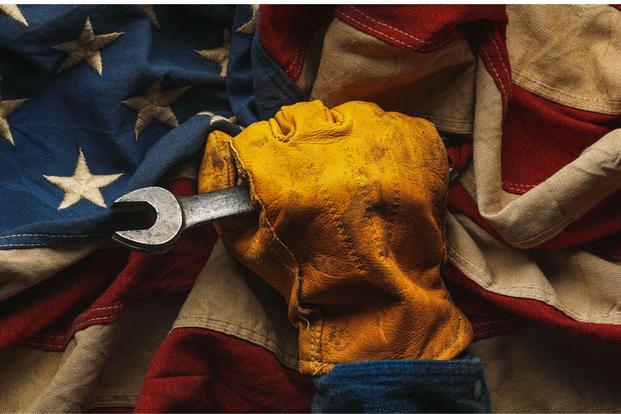Jobs
Is Physical Work Not Respectable Enough for Veterans?

This week, a new veteran jobs study from the Rand Corporation found that younger veterans (ages 26-30) were more likely to hold jobs with greater physical hazards than their civilian counterparts.
This finding was reported in hushed tones, as if physical work was the No. 1 thing to avoid at your next job. As if physical work was less respectable or less desirable than office work. As if physical work is not worthy of veterans and the sign that military service does not open doors to employment.
The study noted that veterans are “uniquely vulnerable” to poor working conditions. According to the study’s authors, “Veterans, who have put their lives and health on the line for their country, should have access to safe, health-enhancing civilian jobs after leaving military service.”
Are Physical Jobs Not Worthy of Veterans?
While I am 100% behind great jobs for veterans — mostly because veterans are the kind of solid, skilled, diligent workers we need in this economy — I wonder if the study’s authors are not missing some essential points about military members, military transition and the nature of work. I wonder whether they are missing how certain factors may affect what kind of jobs young veterans get at first.
Most of all, I’m concerned about how this kind of finding might negatively affect the transition of younger veterans, discouraging them from seeking jobs in certain occupational fields.
At the Veteran Employment Project, we have helped more than 19,000 veterans, spouses and transitioning military members learn the skills they need to find their next high-impact job. We never counsel veterans that the first thing they need to do is to avoid physical labor in their next line of work. Instead, we focus on getting them into the civilian workforce so they can score their best possible start.
7 Factors that Affect Employment for New Veterans
Here are some of the insights we have learned from these post-military workers to keep in mind:
1. Always be surprised if veterans are not different from their matched civilian counterparts. Veterans start out different than their civilian classmates, and this difference persists throughout their lives. As one of my professors in military sociology continually pointed out, those who opt into the all-volunteer force are the kind of people who can commit to a job that requires them to stay for four years. That is an unusual quality at such a young age.
2. Most Americans cannot physically qualify for the military in the first place. I’ve never been a physically gifted person. I’m not fast. I’m not strong. I can’t throw a ball without breaking a window. I always knew I could not make it in the military.
Few can. According to the most recent data, only about 23% of young Americans ages 17-24, can pass the physical, educational and mental health requirements of military service. It seems to me that if you start out more physically capable, that particular ability is going to stay with you. It is not surprising that young veterans rely on that quality when they first leave the military.
3. Some young people do not want to be trapped in a classroom or an office. The three men I admire most — my father, my husband and my son — all joined the military for the same reason. They did not want to be trapped inside behind a desk all their lives. (Full disclosure: My paratrooper son does not even want to be trapped in a plane and insists on jumping out as often as possible.) Veterans looking for post-military work in which physical ability and a preference for change are key qualifiers might be expected instead of decried.
4. Physical work is eminently respectable. Sixty-one percent of American workers perform some kind of repetitive or intense physical labor on the job. Classifying this kind of work as somehow less respectable or desirable takes away some of the intrinsic motivation of doing this essential work. This is leaving the country with a shortage of qualified blue-collar workers. Shaping the future of blue-collar work is an ongoing issue in American labor practices.
5. Physical work is often the buy-in to a new occupational field. We teach veterans that the first task of transition is to get to the other side — from military to civilian life. Switching into a different occupation or industry is a difficult task for any worker in any field to do. Using existing skills in a new field in order to make the switch is a strong practice to be encouraged. In the Rand study, older veterans were no more likely to have heavy physical demands at work than their civilian counterparts, perhaps indicating the switch gets made.
6. Your first job won’t be your last job. Even though our own surveys show that our military users intend to stay in their first civilian jobs for five years or more, we do not expect them to stay in those jobs forever. The research says that 43% of veterans leave their first civilian job within their first year, and 80% leave before the end of their second year, citing a lack of opportunity for career advancement and personal development.
This is not a bad thing. According to LinkedIn data, veterans are, in fact, more likely to get promoted than their civilian counterparts.
7. So many options for other kinds of work. Our users do not complain that their only employment options demand physical labor. Instead, they tell us how overwhelmed they are by the array of training options available. From internship programs to mentoring programs to coding boot camps to certification programs, the opportunities for new and old veterans are endless. What other occupation offers so many retraining programs to their current workers?
Authors of the Rand study indicate that more research is necessary to understand their findings and how new veterans experience their work and their lives. I totally agree. But I think we can already think through a lot of the data and our cultural knowledge to encourage veterans and transitioning military to start where they are with the skills they have — and keep going.
Find the Right Veteran Job
Whether you want to polish your resume, find veteran job fairs in your area or connect with employers looking to hire veterans, Military.com can help. Subscribe to Military.com to have job postings, guides and advice, and more delivered directly to your inbox.







